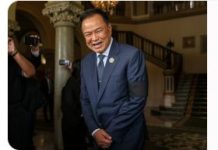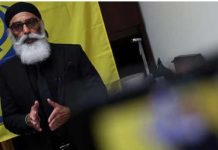SEOUL, DEC 6 (AFP/APP): Key figures in South Korea’s failed martial law bid share one key connection: they are all graduates of a prestigious, all-boys school in Seoul.
The coincidence has sparked wild online speculation and even forced the school — a respectable but not academically famous, fee-paying establishment — to issue a public rebuke of its infamous alumnus.
President Yoon Suk Yeol’s Tuesday declaration of South Korea’s first martial law in decades was swiftly overturned by parliament, and the conservative former prosecutor now faces impeachment and possible jail time.
South Koreans have been quick to point out that 63-year-old Yoon, his former defence minister, interior minister and head of the military’s intelligence all graduated from the Choongam High School.
There’s as yet no evidence that the connection played a role in their disastrous bid to shut down South Korea’s parliament.
But that hasn’t stopped many online from pointing fingers — leading the school’s superintendent Yoon Myung-hwa to quickly discredit her school’s infamous alumni.
She declared Yoon and ex-defence minister Kim Yong-hyun, 65, as “Choongam’s most embarrassing alumni a million times over”.
“They destroyed the reputation of the nation, as well as our school,” she wrote on Facebook.
– Class as usual –
Classes were on as usual at Choongam — a normal-looking high school in a peaceful leafy northwestern district of Seoul — on Friday, though administrators were clearly tense about the unwanted attention the school was getting.
The school is being bombarded by criticism from outsiders, with even bus drivers becoming the targets of bitter rants by citizens angry at current events.
Students have even been given special permission not to wear their school uniforms, local media reported, to prevent them from being targeted by angry members of the public.
When AFP toured the school Friday, students — who were not wearing uniforms — seemed confused to see reporters walking through their building, as they continued with lessons.
Superintendent Yoon told AFP the school was “distressed” to find itself associated with this week’s dark chapter in South Korean democracy.
“We at Choongam educate our students as democratic citizens, to value and treasure democracy,” she said.
“The acts perpetrated by those people are faults of the individual that do not reflect our ideals,” she added.
“As a school, we feel uneasy and distressed about how our education is being faulted for these acts.”
– ‘Choongam clique’ –
Local media have run sensational stories decrying the group of schoolboy chums purportedly behind the dramatic events of Tuesday night, when heavily armed soldiers were helicoptered into the parliament building with orders to “drag out” lawmakers.
Aided by determined staffers who blocked doors with office furniture to keep the soldiers out, enough MPs managed to gather to vote down the martial law declaration.
“The 12.3 martial law: behind the scenes lay the ‘Choongam clique'” wrote the magazine, Sisa Journal. “Was this a ‘Choongam clique’ coup?” asked the Segye Ilbo.
Interior minister Lee Sang-min denied the high school connection playing a role, saying there had been “no exclusive meeting between Choongam colleagues.”
But school networks occupy important roles in South Korean elite society — often seen as one of three key factors, alongside blood ties and regional background, that determine success.
And many pointed to parallels with another group of school graduates whose connection last pulled South Korea into martial law — former president Chun Doo-hwan’s “Hanahoe” army clique.
Chun’s circle of comrades from the Korea Military Academy, South Korea’s West Point, were instrumental in the 1979 coup — and bloody crackdowns — that followed the assassination of President Park Chung-hee.
The autocratic Chun later filled key posts with fellow alumni — even anointing fellow graduate Roh Tae-woo as his successor.
An online post three months before Yoon’s martial law declaration suggesting the so-called “Choongam connection” could try and exercise emergency powers has since gone viral.
“I don’t know if it’s coincidence or not, but there appears to been an almost premodern, one-dimensional connection between the orchestrators of this unconstitutional act,” Lee Joon-han, a politics professor at Incheon University, told AFP.
“Yoon is known to have a very narrow personnel pool based largely on his personal ties,” Lee said.
“This is a recipe for creating an army of yes-men,” he explained.
“There were few stop brakes in between that could have prevented this disaster.”

















